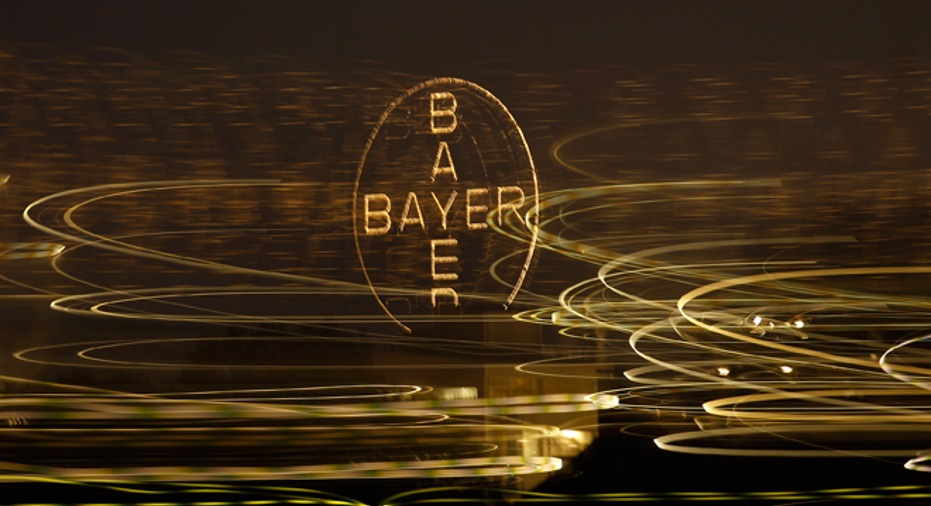Bayer Hits Record High on Move to List Plastics Unit

Germany's Bayer plans to list its less profitable plastics business on the stock market in a deal that could value the division at around 10 billion euros ($13 billion) as it focuses on healthcare, veterinary drugs and crop protection.
News of the planned spin-off of the MaterialScience division, where profit margins are less than half the company average, lifted Bayer shares to a record high. It follows a wider healthcare industry trend of divesting weaker businesses and bulking up in areas of strength.
"In this way Bayer would position itself as a world-leading company in the field of human, animal and plant health," the company said.
Bayer's supervisory board approved the move at a meeting on Thursday and the firm said it would float MaterialScience as a separate company within the next 12-18 months.
Signaling its increased focus on healthcare, Bayer also announced it would step up investment in research and reiterated that five of its key drugs had the potential to generate combined annual sales of at least 7.5 billion euros.
Investors have long speculated that Bayer could split off MaterialScience, which makes transparent plastics for blu-ray discs and panoramic luxury-car roofs, and chemicals for insulation and padding foams.
Jefferies said in a note this week that a spin-off would allow the company to focus on expanding animal health, potentially via acquisitions. They pointed to Zoetis <ZTS.N>, the previous veterinary division of Pfizer <PFE.N> that is now a standalone business, as one possible target.
Shares in Bayer were up 5.1 percent at 111.55 euros by 1130 GMT (7:30 a.m. EDT), outperforming a 0.8 percent gain in STOXX Europe 600 Health Care <.SXDP> index.
Equinet analysts value the MaterialScience unit at almost 10 billion euros while brokerage DZ Bank said it was worth about 11 billion euros including debt.
The healthcare industry has seen a wave of deals this year that have reshaped several large companies.
The juggling of assets was exemplified by a complex three-way deal between GlaxoSmithKline <GSK.L>, Novartis <NOVN.VX> and Eli Lilly <LLY.N> in April to swap consumer, animal health, oncology and vaccine businesses.
U.S. drugmaker Merck <MRK.N> also sold its non-prescription health business to Bayer earlier this year and many large drugmakers are looking to divest some older prescription drugs.
MARGINS
Bayer said its plastics unit had been hit by large increases in raw materials costs, which it had been unable to pass to its customers due to tough competition.
MaterialScience generated adjusted earnings before interest, tax, depreciation and amortization (EBITDA) of 1.2 billion euros in the 12 months to June, 14 percent of the group total.
Average trading multiples in the European specialty chemicals industry of about 10 suggest a value of 12 billion euros including debt.
The division's EBITDA margin in the first half was 11.2 percent, compared with a group-wide margin of 23.6 percent.
Healthcare, Bayer's largest unit, had an adjusted EBITDA margin of 28.2 percent, and smallest unit CropScience had 31.9 percent over the first six months of the year.
"The (plastics) business has underperformed the company's life-sciences operations," brokerage Close Brothers Seydler said in a note.
Bayer, the inventor of Aspirin, polyurethane foams and synthetic rubber, is one of the last European drugmakers that have preserved their historic ties with chemicals. It formed the nucleus of today's chemicals industry as part of a group of German companies alongside BASF <BASFn.DE> that pioneered mass-production of synthetic dyes in the mid-19th century.
But even after a spin-off, Bayer is to remain an unusual hybrid in the pharma industry, combining plant, animal and human health.
Chief Executive Marijn Dekkers, who previously oversaw the merger that created U.S. lab equipment maker Thermo Fisher <TMO.N>, has repeatedly stressed the commercial synergies from the common genetics in life sciences.
Questions will be raised whether an independent MaterialScience unit will continue in its current shape.
Bayer said in March the business was not earning its cost of capital, which it put at 6.9 percent in 2013, and that it hoped to restore the unit's capital return to higher levels by 2016.
Not earning its cost of capital implies the unit's hypothetical standalone market value would decline. The unit posted only a 5.5 percent return on its capital last year.
An independent business would also have to foot a higher bill for central administrative functions such as payroll and finance.



















